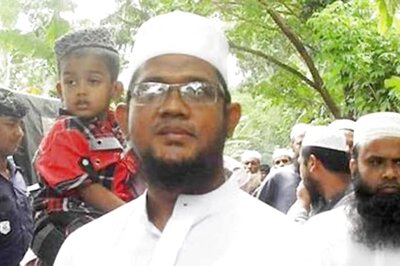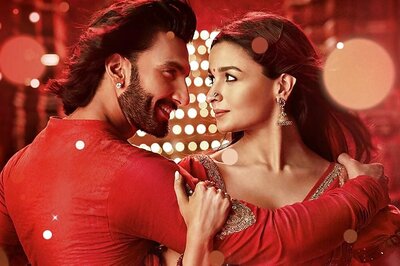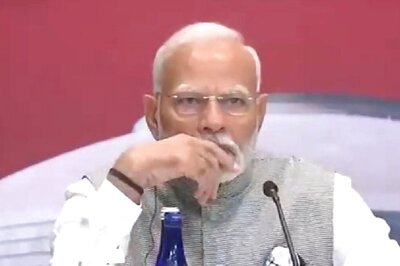
views
In the era of hyper competitive politics, you have to be a 24x7 top performer playing the Test match, ODI and T20 cricket to win all the time. With no room for an iota of error, a majority do not make the top grade.
But there are exceptions to the rule.
Arun Jaitley was clearly Mr Dependent for his party that he formally joined in January 1980.
A top performer who re-imagined the art of credible, creative and constructive politics — something that endeared him to even his political opponents — has sadly ended his innings rather abruptly.
India has lost an astute politician and the BJP probably its all-time best all-rounder.
Jaitley, the man who redefined work integrity, was ever a crisis manager for his party. His rise coincided with the rise of his party. It is tragic that when his party has risen to the pinnacle of its glory, he bid an early goodbye.
For the BJP, his contribution to its northbound growth has been stellar. Now that Narendra Modi’s BJP has taken up the challenge of building a new India, Jaitley would be surely and sorely missed.
Mr Indispensable
What made Jaitley almost indispensable to Modi, the BJP and the government during the last five years?
Jaitley had four outstanding capabilities and the blend was rare — his core expertise lay at the intersection of business and politics; his articulation (bilingual) presented the BJP as a party with a difference; his strategic mind helped the party find allies at a time when there was diffidence (especially on the eve of the 2014 Lok Sabha elections) and, finally, his distinct appeal made him popular across India's political spectrum.
From welfare economics to market mantras, Jaitley articulated a new successful paradigm that came to define the BJP’s brand of politics. This was his unique calling card.
His first official assignment, having started his legal practice in 1977, came in 1990 when he was appointed the Additional Solicitor General of India. The broad sweep of his intellectual rigour was on display early on when, as a member of the Indian delegation to the United Nations in 1998, the resolution on money laundering and drugs was adopted.
Jaitley's ability to transcend domains — law, communications, politics, business, and society — defined him as he grew in stature within the party and the government, first in the Atal Bihari Vajpayee government and later coming into full bloom in May 2014 when he was entrusted by the Prime Minister the rather challenging task of managing three diverse ministries — finance, defence, and corporate affairs. He also had the information and broadcasting ministry with him for some time.
During the Vajpayee era earlier, Jaitley held the portfolio of the Minister of State, I&B, being elevated to a full Cabinet rank in 2000 when he was made the Union minister for Law, Justice and Company Affairs. During an interaction with him as the I&B minister, he put out a case for re-imagining the ministry beyond the confines of Shastri Bhawan and looking at the media world as a business.
In 2001, Jaitley was made the first shipping minister, an additional charge. Two years later, he led India’s trade push at the World Trade Organization (WTO) meeting in Mexico's Cancun in his capacity as the commerce minister. The world noticed him there for his nuanced study of global trade and the role India had to play in setting the agenda.
Personal connect with Modi
Jaitley's politics got on the escalator when Modi came to power in 2014. Jaitley displayed another astounding capability – that of seamlessly managing the leadership transition in the party. His personal connect with Modi, early on when the latter was the Gujarat chief minister and didn’t have many friends in Delhi, made Jaitley the most trusted member of his Cabinet.
Outside the Cabinet, Jaitley helped ease Amit Shah into a superlative role in the party. But it is to his credit that he navigated the Gujarat relationship even as he was widely seen primarily belonging to Lutyens Delhi. The thriving co-existence happened primarily because of the enduring value he brought to the dispensation.
That intrinsic value Jaitley offered to his leadership helped cement the trust factor. So for two of the most bold and controversial yet historic decisions of the Modi 1.0 era, Jaitley was the man for Modi almost on every issue. At heart a pro-business politician, he changed gears to suit Modi’s embrace of the poor.
As finance minister, Jaitley presided over three historic decisions that had a defining impact (good, bad and ugly) on the economy. From demonetisation to Goods and Services Tax (GST) to the Insolvency & Bankruptcy Code (IBC), Modi turned to Jaitley as his opening batsman.
But Jaitley was equally at home in matters of internal security, especially Jammu and Kashmir. Married to the daughter of Jammu political veteran Giridhari Lal Dogra, his last essay was on the abrogation of Article 370. Having met him a few times over the last two-plus decades, Jaitley's first recall for me was my being from the Valley.
Amritsar Loss
But Jaitley had his share of controversies as well. Apart from the charge of poor execution of demonetisation and GST, the Opposition saw in him a part-time defence minister during Modi’s first term. Some held the view that he perhaps was over-leveraged.
Jaitley's Lok Sabha loss in 2014, when he contested for the first time from Amritsar, was seen as his inability to have a mass connect despite being a mainstream leader who had risen from the ranks and become the party's prime face.
That he lost when the Modi wave launched the NDA to power positioned him more as a strategist rather than a street-smart politician. This, however, did not lessen in any way his importance in Modi’s scheme of things. But a lack of a mass connect did stick!
Cricket, another interesting part of his multi-dimensional personality, brought Jaitley some good, bad and ugly vibes. Apart from a few loose corruption charges, there was a view that for a full-time politician, cricket administration ought not to be a top priority.
But his overall innings would be seen by his admirers and opponents alike as one that helped shape the story of contemporary India. He returned to the crease having undergone a major kidney transplant surgery in May 2018.
In January this year, Jaitley suffered another major ailment that took him to New York for treatment. He, however, soldiered on, being the key spokesperson for the government (through his writings) right until the end. Jaitley wrote his last blog on August 6, three days before he was admitted to AIIMS. On Sushma Swaraj’s death, earlier on August 7, Jaitley tweeted that he was sad, pained and broken. That, perhaps, was his last public utterance.
With both the leaders gone untimely, it is like losing the two top-form batsmen in a single over for the BJP. For India, too, it is a huge loss. Intellect-backed civility in politics will be even more in deficit now

















Comments
0 comment